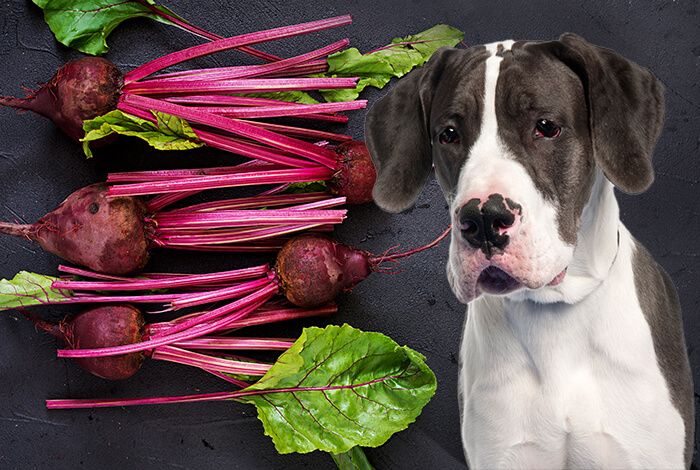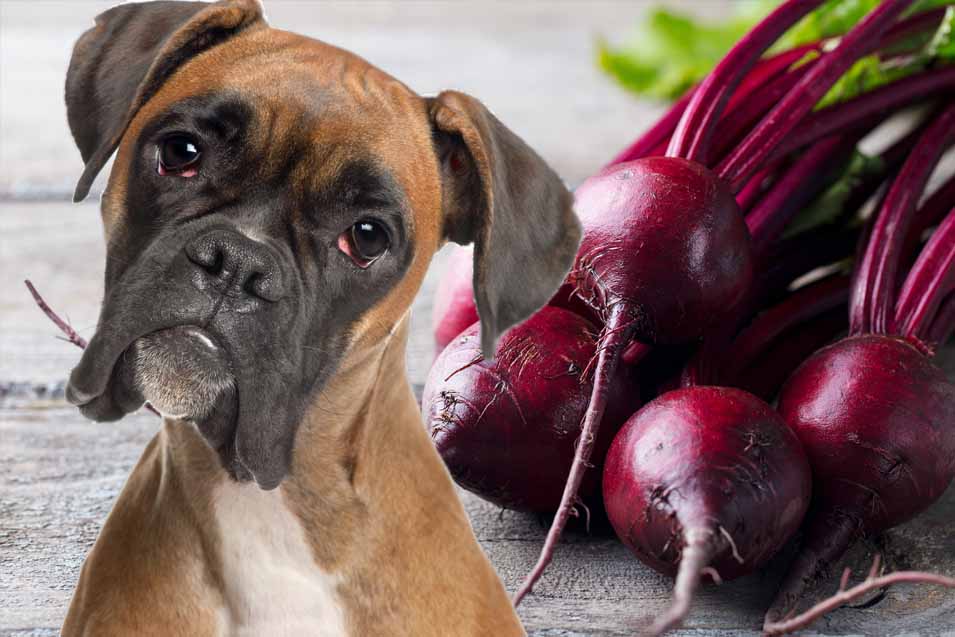Dogs are often curious eaters, and as pet owners, it is essential to ensure that we provide them with a balanced and healthy diet. When it comes to feeding our furry friends, questions may arise about various foods, including beets. In this article, we will explore the topic "Can dogs eat beets?" to understand the potential benefits and risks associated with including beets in a dog's diet. Let's delve into the world of beets and their impact on our canine companions.

The Nutritional Profile of Beets
Beets are rich in essential nutrients that contribute to overall health. They are low in calories and fat, making them a nutritious choice for both humans and dogs. Here is a breakdown of the key nutrients found in beets:
· Fiber: Beets are a good source of dietary fiber, which aids in digestion and promotes a healthy digestive system in dogs.
· Vitamins: Beets contain various vitamins, including vitamin C, folate, and vitamin A, which play essential roles in maintaining a dog's overall health.
· Minerals: Beets are packed with minerals like potassium, manganese, and iron, which support vital bodily functions and contribute to strong bones and muscles.
Are Beets Safe for Dogs?
Yes, in general, beets are safe for dogs to eat. They are not known to be toxic to canines. However, there are a few considerations to keep in mind:
· Moderation: Like any food, moderation is key. While beets offer nutritional benefits, they should be given as part of a balanced diet and in appropriate quantities.
· Introduce Gradually: When introducing beets to your dog's diet for the first time, start with small amounts to gauge their reaction. Some dogs may have individual sensitivities or allergies.
· Preparation: It's typical to properly prepare beets before feeding them to your dog. Beets can be cooked or steamed to enhance digestibility and make them easier for your dog to consume.
Health Benefits of Beets for Dogs

Aids Digestion
Beets are a great source of dietary fiber, which can promote healthy digestion in dogs. The fiber content helps regulate bowel movements, prevent constipation, and maintain a healthy gastrointestinal tract.
Supports Immune System
Beets contain vitamin C, a powerful antioxidant that supports a strong immune system in dogs. A robust immune system helps protect against infections, diseases and promotes overall well-being.
Promotes Healthy Skin and Coat
The vitamins and minerals present in beets contribute to healthy skin and dog coat color. The antioxidants and vitamin A help maintain skin integrity, while the iron content supports the production of healthy hair follicles.
Provides Antioxidant Protection
Beets are rich in antioxidants that can help neutralize harmful free radicals in a dog's body. This antioxidant protection can contribute to reduced oxidative stress and support overall cellular health.
Supports Heart Health
The nitrates found in beets have been associated with cardiovascular health benefits. They may help promote healthy blood pressure levels and improve blood flow, which can positively impact heart health in dogs.
Anti-inflammatory Properties
Certain compounds in beets have anti-inflammatory properties, which can be beneficial for dogs with inflammatory conditions such as arthritis. However, it's necessary to consult with a veterinarian before using beets as a treatment option.
Introducing Beets to Your Dog's Diet
When introducing beets to your dog's diet, it's essential to proceed with caution and follow these guidelines:
Easing fear at the vet: Before making any significant dietary changes for your dog, consult with your veterinarian. They can assess your dog's overall health, and specific nutritional needs, and guide you on incorporating beets into their diet.
Start with Small Quantities: Begin by offering small amounts of cooked or steamed beets to your dog. Monitor their response and observe for any signs of adverse reactions or digestive issues. If all goes well, you can gradually increase the serving size.
Proper Preparation: Beets should be cooked or steamed before feeding them to your dog. Raw beets can be challenging for dogs to digest. By cooking or steaming, you enhance the digestibility of the beets and make them more palatable for your furry friend.
Monitor for Allergic Reactions: While rare, some dogs may have allergies or sensitivities to beets. Watch for signs such as itching, rashes, swelling, or gastrointestinal distress after introducing beets. If you notice any adverse reactions, discontinue feeding beets and consult your veterinarian.

Potential Risks and Considerations
While beets can offer health benefits, there are some potential risks and considerations to be aware of when including them in your dog's diet.
Oxalate Content
Beets contain oxalates, which, in large quantities, can contribute to the formation of kidney stones in some dogs. If your dog has a history of kidney issues or is prone to stone formation, it is best to avoid feeding them beets.
Allergic Reactions
Just like humans, dogs can have allergies or sensitivities to certain foods. Keep an eye out for any signs of an allergic reaction, such as itching, swelling, or gastrointestinal distress, after introducing beets.
Beeturia
Beeturia refers to the reddening of urine and feces after consuming beets. While this condition is harmless, it is essential to be aware of it and not mistake it for any underlying health issues.
Alternative Ways to Include Beets in Your Dog's Diet
If you're looking for alternative ways to incorporate beets into your dog's diet, here are some ideas:
1. Beet Puree
You can prepare a beet puree by cooking or steaming the beets and then blending them until smooth. This puree can be added to your dog's regular meals as a tasty and nutritious addition. Start with small amounts and gradually increase as your dog adjusts to the new flavor.
2. Beet Treats
Homemade beet treats can be a fun and healthy snack for your dog. You can find recipes online that use beet puree as one of the main ingredients. Make sure to choose recipes that are suitable for dogs and avoid any ingredients that may be harmful to them, such as chocolate or excessive sugar.
3. Beet and Veggie Mix
Create a colorful and nutritious veggie mix for your dog by combining cooked or steamed beets with other dog-friendly vegetables like carrots, sweet potatoes, or green beans. Chop the vegetables into bite-sized pieces and mix them for a wholesome and fiber-rich addition to your dog's meals.
4. Frozen Beet Cubes
Freeze small beet cubes to create refreshing and crunchy treats for your dog, especially during hot weather. Simply cut cooked or steamed beets into small cubes and place them in the freezer until they harden. These frozen beet cubes can provide a satisfying texture and a burst of flavor for your furry friend.
5. Beet and Meat Medley
If your dog enjoys meat, you can mix small amounts of cooked or steamed beets with lean meats like chicken or turkey. This combination provides a balanced meal with added nutrients from the beets. Ensure that the meat is boneless, skinless, and cooked thoroughly before serving it to your dog.

Remember, when introducing any new food or treat to your dog's diet, it's critical to monitor their reaction and consult with your veterinarian if you have any concerns or questions.
Signs of Beet-Related Digestive Issues
While beets are generally safe for dogs, some dogs may experience digestive issues or sensitivities when consuming them. Here are some signs to watch out for:
Diarrhea
If your dog develops loose or watery stools after consuming beets, it may be a sign of digestive upset. Diarrhea can occur due to the high fiber content of beets or individual sensitivity to the vegetable.
Vomiting
In some cases, dogs may vomit after eating beets. This can happen if the beets are not properly cooked or if the dog has a sensitive stomach. Vomiting may also be accompanied by other signs of discomfort, such as drooling or restlessness.
Excessive Gas
Beets contain sugars that can ferment in the digestive system, leading to increased gas production. If your dog experiences excessive flatulence or bloating after eating beets, it may indicate difficulty digesting the vegetable.
Discomfort or Abdominal Pain
Dogs with sensitivities to beets may experience discomfort or abdominal pain. They may show signs of restlessness, pacing, or reluctance to engage in regular activities. If you notice these behaviors, it's important how often vet.
Allergic Reactions
Although rare, some dogs may be allergic to beets. Allergic reactions can manifest as itching, hives, swelling, or difficulty breathing. If you suspect an allergic reaction, seek immediate veterinary care.

Fun Facts about Dogs and Beets
Let's explore some interesting facts about dogs and beets:
Dogs Can Taste Sweetness
Unlike cats, dogs have taste receptors for sweetness. This means that they can detect and enjoy the natural sweetness present in beets. The sweet flavor may make beets appealing to some dogs.
Beets Can Give Urine and Feces a Reddish Color
Beets contain a pigment called betanin, which can pass through a dog's digestive system and lead to a reddening effect on urine and feces. If you notice a reddish tinge in your dog's waste after consuming beets, there's no need to worry. This discoloration is harmless and temporary.
Beets Provide a Natural Source of Antioxidants
Antioxidants are essential for overall health and well-being, and beets are a rich source of these beneficial compounds. The antioxidants found in beets can help neutralize harmful free radicals in a dog's body and contribute to reduced oxidative stress.
Beet Greens Can Be Nutritious for Dogs
Not only can good family dogs enjoy the beetroot itself, but they can also benefit from the leafy greens attached to the beets. Beet greens are packed with vitamins and minerals and can be a healthy addition to your dog's diet. Ensure that the greens are thoroughly washed and chopped before feeding them to your dog.
Beets Should Be Given in Moderation
While beets can be a nutritious addition to a dog's diet, it's required to offer them in moderation. Too many beets can cause digestive upset due to their high fiber content. It's always best to introduce new foods gradually and observe how your happy dog reacts to them.
Conclusion
In conclusion, beets can be a nutritious addition to your dog's diet, offering various health benefits. However, it is crucial to introduce them gradually, seek guidance from your veterinarian, and monitor your dog's response. Remember to cook beets thoroughly and be aware of any potential risks or allergic reactions. By taking these precautions, you can safely incorporate beets into your dog's diet and contribute to their overall well-being.
FAQs
1. Can dogs eat raw beets?
· Raw beets are challenging for dogs to digest. It is recommended to cook beets before feeding them to your dog.
2. Are beet greens safe for dogs?
· Beet greens can be fed to dogs in moderation. They are rich in nutrients but should be cooked before offering them to your pet.
3. Can beets change a dog's urine color?
· Yes, beets can cause temporary reddening of urine and feces in dogs. This condition is known as beeturia and is harmless.
4. How often can I feed my dog beets?
· Beets should be fed to dogs in moderation and as part of a balanced diet. Consult with your veterinarian for specific recommendations.
5. Are there any alternatives to beets for dogs?
· Yes, other vegetables can offer similar nutritional benefits to dogs, such as carrots, sweet potatoes, and green beans.
6. Can beets be fed to all dogs?
. Beets can be fed to most dogs, but individual sensitivities and allergies should be taken into consideration. Consult with your veterinarian before introducing beets to your dog's diet.
7. How much beet should I feed my dog?
. Start with small amounts of beet and observe your dog's reaction. If there are no adverse effects, you can gradually increase the portion. Remember to feed beets in moderation as part of a balanced diet.
8. Can beets cause urinary problems in dogs?
. In some cases, beets can contribute to the formation of kidney stones in dogs due to their oxalate content. Dogs with a history of kidney issues or prone to stone formation should avoid beets.




